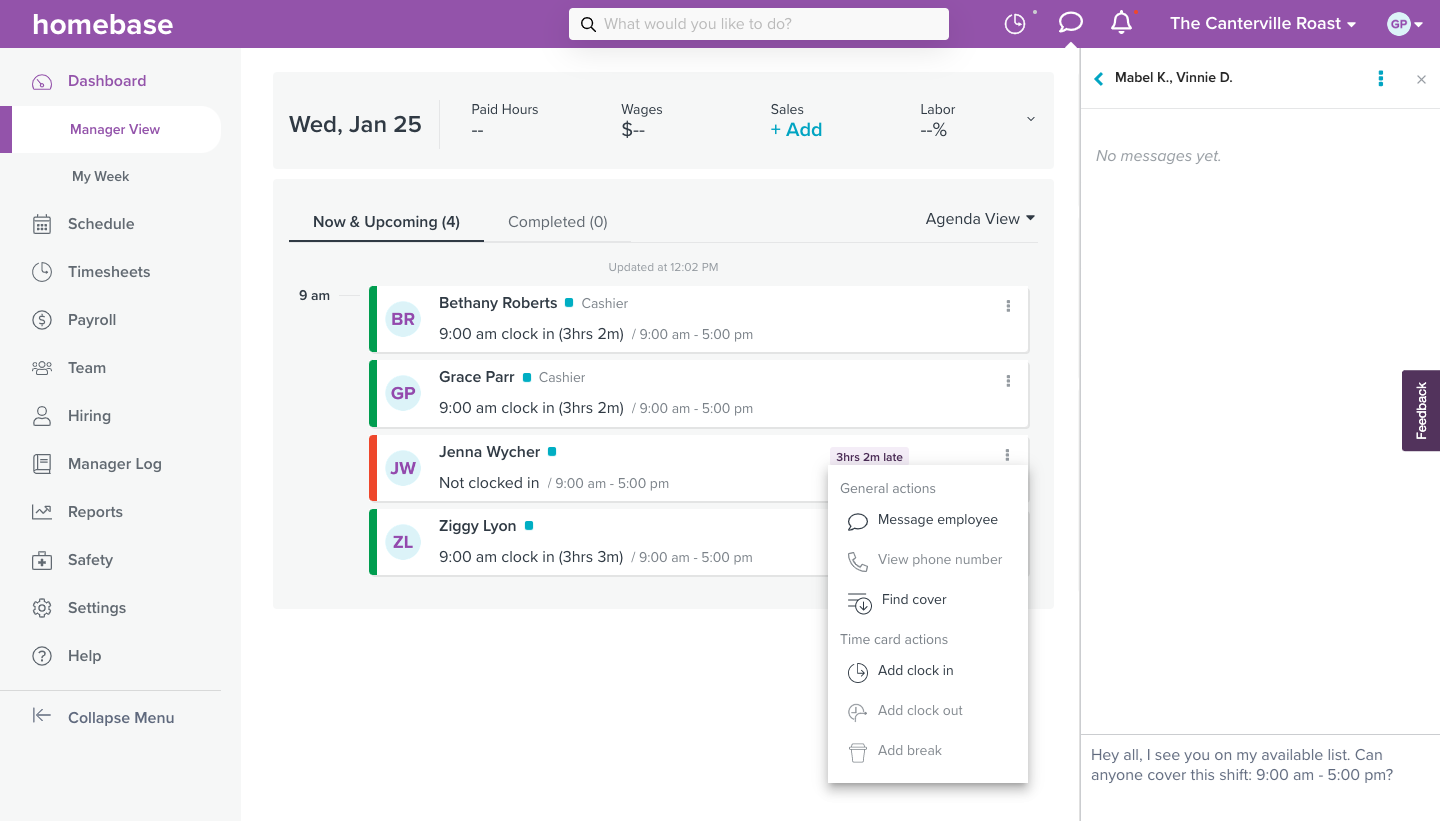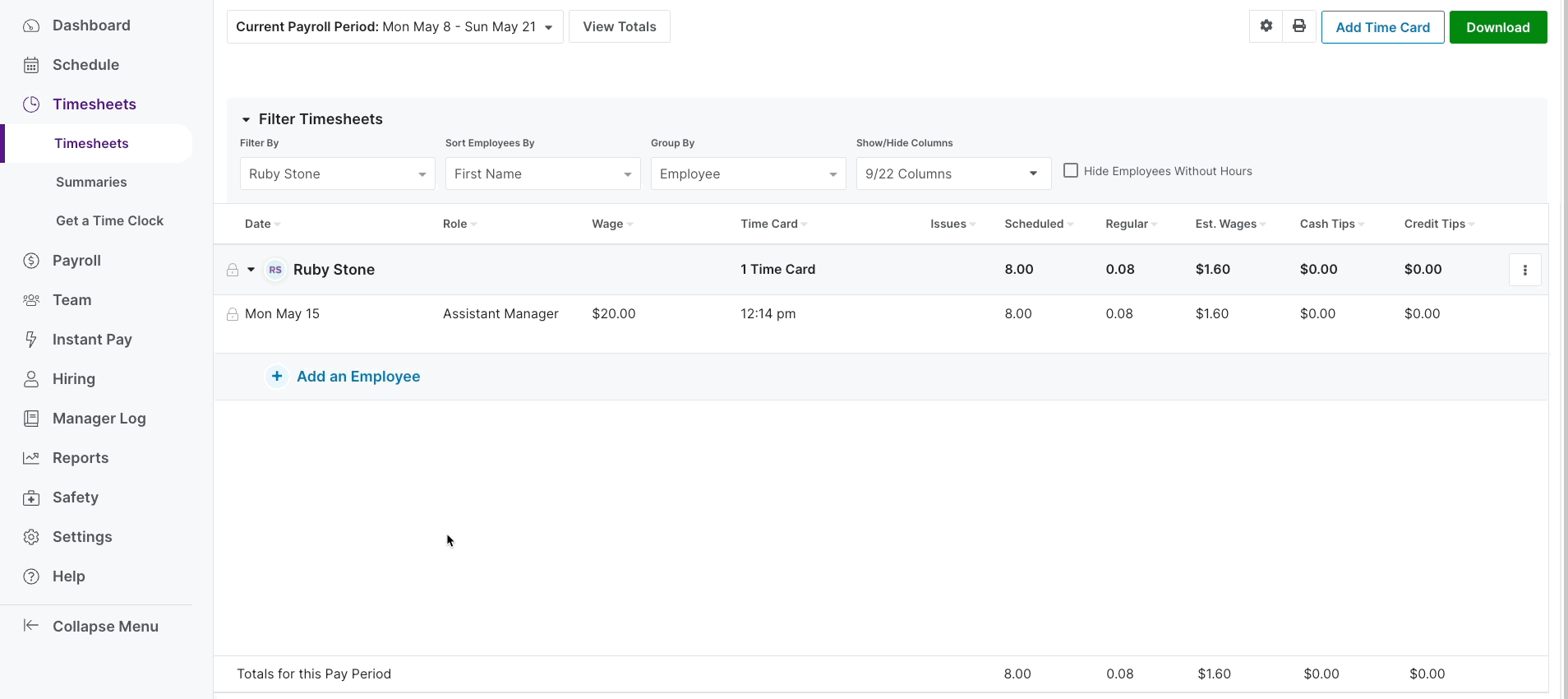You’ve got the passion and the vision. Maybe you’ve even helped plan a friend’s wedding or a company party. But taking the leap into starting your own event planning business? That’s a whole new ballgame, and it’s normal to feel lost or overwhelmed.
It’s about practical steps, hard work, and a sprinkle of creativity.
From identifying your target market to tackling legal requirements, we’ll walk you through everything you need to know, without the runaround. We’ll even give you a heads-up about tools like Homebase that could be useful down the line.
1. Research and market analysis
The first step is to have a clear picture of the market landscape. Your goal? Uncover opportunities and threats, so you can position your business effectively.
Here’s how you can approach it, step by step:
- Identify your competitors: Who’s already out there? What services do they offer, and at what price points?
- Understand your target audience: Who are you catering to? What are their needs and budgets? If your area hosts many small businesses, maybe affordable launch events are a niche.
- Analyze trends and demands: What’s trending in your area? Farm-to-table weddings or tech-savvy corporate gatherings? Tools like Google Trends are a goldmine.
- Ask these key questions:
- What makes your region unique, and how can you leverage it?
- What mistakes have others made that you can learn from?
- What support networks (vendors, venues, etc.) are available locally?
These steps are the foundation of your business. Research wisely so your choices are data-driven, not just gut feelings.
2. Decide on your niche, services, and branding
Once you’ve got a grip on the market, it’s time to carve out your own space. Choosing a niche is more than picking a category; it’s about finding where your passion and the market’s need intersect.
Here’s how to approach it:
- Find your niche: Are you aiming for tech conferences, startup launch events, or perhaps industry-specific trade shows? Identify what excites you and what’s in demand in your area. For example, if you live in a tech hub, focusing on tech-related corporate events could be your sweet spot.’
- Define your services: What will you offer within your niche? Will you offer end-to-end solutions or specialize in certain aspects like venue selection or guest management? Perhaps your forte is virtual event planning, catering to remote teams.
- Create your brand: This is where you tell your story. What makes your service unique? Is it your attention to detail, your creative flair, or your commitment to sustainability? Your brand should reflect this. Think about:
- Logo and visuals: These should echo your style and the feel of the events you plan.
- Mission statement: What sets you apart in the business event landscape? Is it your innovative approach or unbeatable vendor connections?
- Value proposition: Clearly define what clients will gain by choosing your service. Is it the seamless integration of technology or the unique venues you offer?
Deciding on a niche is all about focusing your energy where you can truly shine. This is where your business starts to feel real, so take the time to get it right.
3. Build a business plan and establish pricing

Let’s say you’re launching your event planning business, focusing on corporate events like conferences and product launches. You’ve recruited a small team, and one of your first projects is a week-long business expo in a city with stringent labor regulations.
Suddenly, you find your team working longer hours, right on the edge of breaching overtime rules. Failure to comply with local labor laws could mean fines, not to mention the potential harm to your budding reputation. It’s a real headache that you didn’t need at such a critical time.
With a platform like Homebase, you can easily access information on local labor laws, calculate correct overtime pay, and even consult live with a certified advisor to review your staffing plan.
Plus, establishing pricing demands a clear understanding of costs, including potential legal costs. With access to Homebase’s digital library of guides, training, and templates tailored to your business, you’ll be well-equipped to build a solid, compliant foundation to build a sustainable and legally sound business.
4. Start networking and community-building
Your network isn’t just about gathering names and numbers. It’s about building a community that you can rely on, and that trusts you in return.
Here’s how you can build your network effectively:
- Suppliers and vendors: Establish relationships with dependable suppliers. If you’re organizing a tech conference, having a reliable tech supplier ensures that you’ll have the latest gadgets and gear on time. No last-minute scrambles, no disappointed clients.
- Venue partnerships: Negotiate partnerships with unique venues. Let’s say you find a modern, eco-friendly building that resonates with your client’s brand for a product launch. Forming a relationship with this venue could mean exclusive access to future events.
- Event-related alliances: Collaborate with other event-focused businesses. If you’re planning a business gala, team up with a renowned local chef to offer exclusive catering options, turning a standard meal into a gourmet experience.
- Community engagement: Don’t just network; engage with your community. Attend local business events, join professional groups, and actively participate. When you’re planning a charity fundraiser, having strong community ties can amplify your reach, making the event a true success.
5. Develop online presence and marketing strategy
Your online presence isn’t just a part of your marketing strategy; it’s often the first impression potential clients will have of your business event planning services.
Here’s how you can ensure it’s a lasting one:
- Website: Your website is your digital storefront. Make it sleek and professional, highlighting your previous successes. Include a portfolio of past business conferences or trade shows, so potential clients can see your expertise in action.
- Social media: Utilize platforms like LinkedIn and X (formerly Twitter) to engage with other professionals. Share valuable insights about event planning, showcase behind-the-scenes preparations, and celebrate successes.
- Content marketing: Start a blog or a YouTube channel sharing behind the scenes in planning your grand opening and other tips starting your business events. By offering free, valuable content, you position yourself as an expert, attracting clients who value your insights and approach.
- SEO and advertising: Invest in Search Engine Optimization (SEO) and targeted advertising to reach potential clients actively looking for event planning services. If a business is searching for a planner for their next big product launch, you want to be at the top of their search results.
- Client testimonials: Encourage satisfied clients to leave positive reviews on platforms like Google My Business. Imagine a potential client reading a rave review about the seamless execution of a recent business expo you organized. That’s a powerful motivator.
6. Determine how you’ll manage sales and customer relationship management (CRM)
Sales and CRM are the heart of your event planning business; they keep the clients coming and the relationships growing.
- Understand your clients: Know what businesses are looking for in an event. Are they aiming for an innovative product launch or an elegant corporate dinner? Understanding their needs ensures you can pitch the perfect event.
- Use CRM tools: Tracking interactions, setting reminders, and managing follow-ups become streamlined. With CRM tools, you’ll never miss a follow-up call after a successful sales meeting.
- Create customized proposals: Tailor your proposals to each client. If a business wants to host an eco-friendly conference, present a proposal showcasing your expertise in sustainable event planning. It’s personal touches like these that seal the deal.
- Provide exceptional service: After the contract is signed, the real work begins. Regular updates, clear communication, and exceeding expectations turn a one-time client into a long-term partner. Think of a client so impressed with the launch event you planned that they automatically think of you for their next one.
- Ask for feedback: Post-event, request feedback and address any concerns promptly. If something didn’t go as planned during a seminar, knowing what went wrong and fixing it turns a potentially negative experience into a showcase of your professionalism.
- Maintain relationships: Don’t let the connection go cold after the event. Send thank-you notes, share relevant content, or simply check in from time to time. It’s these small gestures that keep you in their minds for future events.
7. Consider how you’ll run your small business into the future

Initially, it might be just you and some contractors, but as you secure more contracts for business conferences, product launches, or corporate retreats, you’ll likely need to expand your team.
When this growth happens, you can use a tool like Homebase to handle time-sensitive events and simultaneously juggle timesheets, payroll, hiring and onboarding, and compliance. With Homebase, you can directly link team members’ timesheets with their time tracking data, so you can round accurately and legally.
It also lets you set up communication alerts to avoid staff accidentally rolling into expensive overtime and send team members reminders to take their breaks and clock out of work on time.
Plus, Homebase’s scheduling and manager log can be integrated with your point-of-sale system, so you can easily track when your peak periods are and assign staff accordingly. Add notes and give a human perspective on the data collected, all aimed at streamlining operations and boosting staff engagement further.
Get your event planning business on track with Homebase
From market analysis to networking, each step has its own challenges. How do you find the right vendors? What strategies will make your online marketing effective? How do you handle customer relationships as the business scales?
And what about the backend, operations, and team management? With an all-in-one HR and team management solution like Homebase, you can set and review internal policies, onboard new team members, and run payroll all in one place, even accessible on the cloud.
By combining time tracking with scheduling, payroll, and communication tools, you’re not just managing your team, you’re efficiently handling everything from assigning shifts to making payments. Advanced clock-in verification tools help you monitor when staff members are working, be it on-site or off-site.
And with our free plan, you can access many of these high-impact features for up to 20 employees at a single location without any cost.
FAQs about starting an event planning business
Is event planning profitable?
Yes, event planning can be profitable. The key is identifying your niche, whether it’s weddings, corporate events, or social gatherings, and tailoring your services to meet those specific needs. Profitability may vary based on location, experience, and scale, but with proper planning and execution, an event planning business can be both a rewarding and financially successful endeavor.
How do you start as an event planner?
You can start as an event planner by:
- Identifying your niche and target market
- Building a business plan outlining your services, pricing strategy, and marketing approach
- Acquiring necessary certifications or training to enhance your credibility
- Networking with vendors, venues, and other industry professionals
- Creating an online presence with a professional website and active social media accounts
- Offering initial services to friends or family to build your portfolio
- Gradually, expanding your reach through word-of-mouth and online advertising
- Being detail-oriented, creative, and customer-focused
